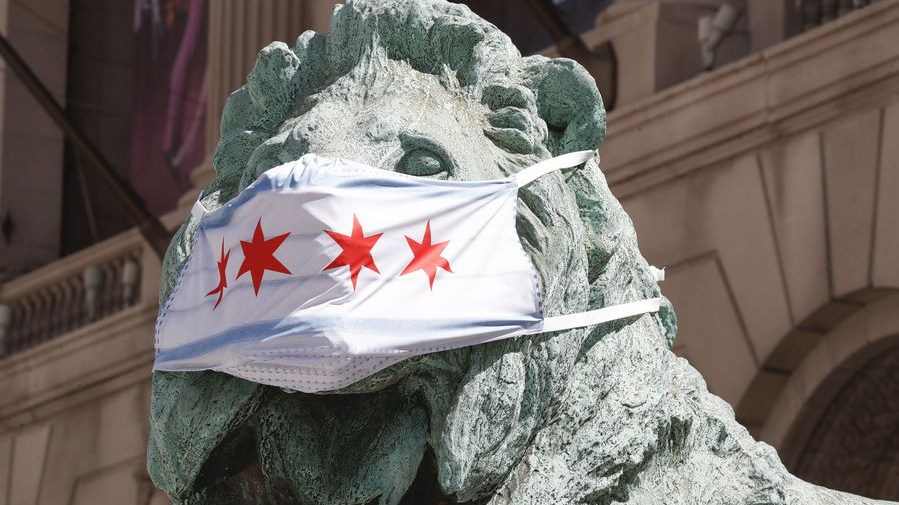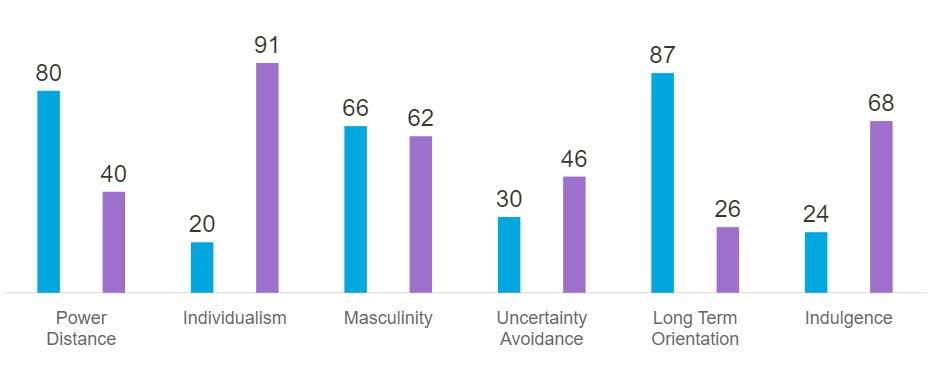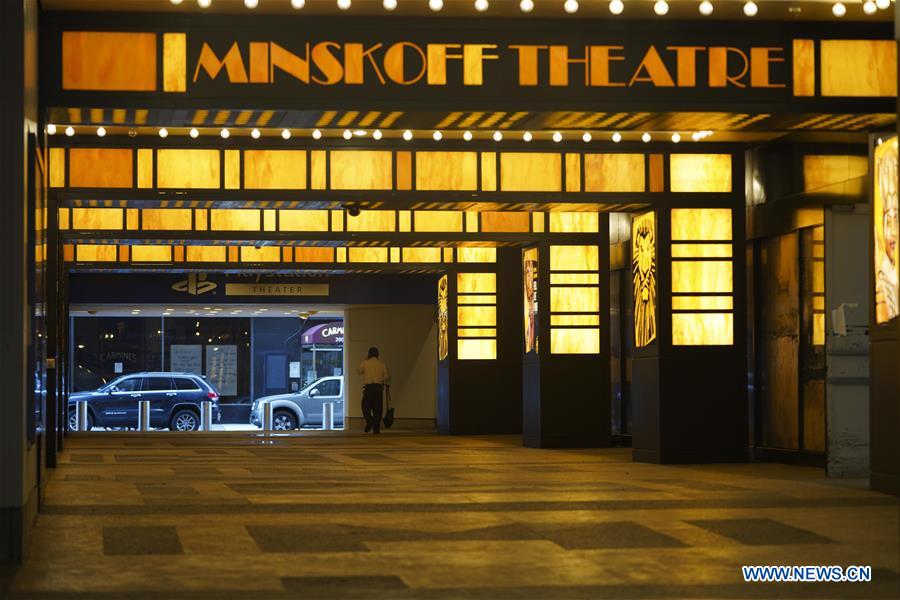
A lion statue with a mask in front of the Art Institute of Chicago in Chicago, Illinois, U.S., May 1, 2020. /Xinhua
A lion statue with a mask in front of the Art Institute of Chicago in Chicago, Illinois, U.S., May 1, 2020. /Xinhua
Editor's note: Jerry Grey is a China observer who has residency in China and bicycled across several provinces, including the Xinjiang Uygur Autonomous Region. He is a former London Metropolitan police officer with decades of experience in law enforcement and the security industry. The article reflects the author's opinions, and not necessarily the views of CGTN.
"If China really beat the Coronavirus like they claim, we should send all of their diplomats back home until they tell us how. It wasn't masks," Scott Adams, one of my favorite cartoonists, tweeted recently. But I can't agree with it. It got me thinking, so I went back to my Workplace Psychology studies and looked at Dimensions of Culture by Geert Hofstede, a Dutch social psychologist well known for his pioneering research on cross-culture studies.
Hofstede analyzed how national psychological traits dictate our behavior at work. If we extrapolate this it's a perfect way to view the success of China against the backdrop of a pandemic running wild in the U.S.

Screenshot of the China-U.S. national culture comparison. Tool available at www.hofstede-insights.com
Screenshot of the China-U.S. national culture comparison. Tool available at www.hofstede-insights.com
In the chart above, China is blue and United States is purple. There are some similarities (Masculinity and Uncertainty Avoidance), but also dramatic differences between other dimensions of culture in these two countries.
Let's, for the purposes of this article, forget politics, forget governance and forget about the claims of lockdowns, forget that China's central government gave one single consistent message while mixed messages came from the U.S. president who argued with state governors.
Forget that masks were deemed unnecessary by the Centers For Disease Control And Prevention (CDC) and other scientists, in order to cover the fact that there weren't any available. So much so that, by the time they were available and recommended, many people had formed opinions based on political messages. Dr. Fauci, at first, did not advocate wearing masks, simply because there were none available for public and hospital or medical providers needed them.
Instead, let's look at a more academic or scientific way to describe how China did something the West struggles to do. We're seeing incredulity and reading reports of "fake news" or "Chinese misinformation" stemming from utter disbelief within the U.S. that China could have done anything right. These reports ignore one very simple point: we aren't alike.
If we take a look at the bar chart we can see, both are ambitious and hard-working: this is reflected in the column called Masculinity.
Both nations have some confidence in their future and this is shown in the Uncertainty Avoidance column – China being slightly more confident, or less pessimistic, about its future than the U.S., perhaps due to factors such as political stability and no war for a generation.
Where the two nations differ is much more important.
With a high Power Distance Index, Chinese people know their place and accept it. What this means is that, when the father tells the child to do something, they do it, when the boss tells the employee to do something, they do it, even if, sometimes they may disagree, it's natural for Chinese people to do this, it explains why Chinese students are so well behaved in classes too.
When the government tells the country to do something, generally, the country accepts that it needs to be done, even when some disagree and they do it.
Most Americans can't understand this because in the U.S., there are deeply established rights of freedom, an American would say: "you can't tell me what to do" and then proceed to do what they felt was their right and privilege.
What's profoundly important about this is that, just as Americans can't understand Chinese acquiescence and see it as subjugation, Chinese don't understand this degree of freedom and view it as selfish.

A worker walks through a corridor of a Broadway theater in New York City, U.S., October 7, 2020. /Xinhua
A worker walks through a corridor of a Broadway theater in New York City, U.S., October 7, 2020. /Xinhua
Individualism in the United States is extremely high, while in China, it's extremely low. This low factor helps communities work well together, it keeps people working in teams and accepting that the best thing for the community is not what's best for "me."
High individuality could account for the fact that people like Mike Pompeo constantly suggests Chinese people need to be "rescued" from their government.
Because for highly independent people, living the way Chinese communities do, with constant checks on their welfare and a government that supplies and meets their needs, seems to be authoritarian – it's not, it's the way that thousands of years of Chinese culture has engrained the differences between them and a country with a short history built on an individual, pioneering spirit of exploration.
Long Term Orientation manifests itself in an interesting way. The Chinese government looks a generation ahead, Americans think one political cycle. China has plans out to 2035 and implements things today that were planned years ago. On a personal, or individual level, this manifests itself in different ways. It's well known that Chinese people like to save money, the U.S. citizen "lives for today."
Look at recent breadlines just a few weeks into a lockdown, some Americans struggled to feed themselves. No income means they can't service debts nor can they meet rental payments. I lived in China throughout the lockdown, I saw no issues getting food, no hoarding, no price gouging and no breadlines – in fact the only time I saw a line was never more than 20-30 people for masks, never 6,000 cars representing families with insufficient income to feed themselves.
Chinese citizens used their savings for daily necessities and their confidence in government systems meant that there was no need to bulk purchase, rare examples of price gouging were dealt with by severe fines and business closures. This confidence meant people freely did what the government asked.
Indulgence is another very large cultural gap. Make no mistake, many Chinese people love to indulge themselves, but only do so when they can afford it and when the time is right.
Americans will indulge themselves whenever they want and seem to live comfortably with the attitude of "it won't happen to me." Just last week, the CDC asked people not to travel during the Thanksgiving holiday.
Yet, 40 million people have pre-booked flights and we know the roads will be full of cars travelling from one town or city to another. An indulgence that Chinese people, with very few exceptions, sacrificed when their government asked them not to celebrate the equally important Chinese New Year.
So, it wasn't just masks. It was a willful and positive regard for the health and safety of others in the community, a confidence in, and sensible following of, government guidelines as well as a totally different culture which brought China through COVID-19 and keeps Chinese people safe.
(If you want to contribute and have specific expertise, please contact us at opinions@cgtn.com.)

